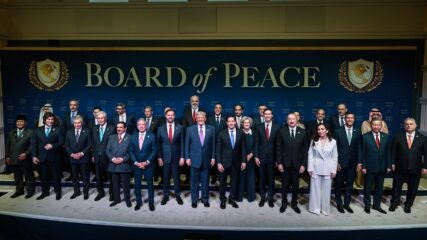Rabbi Arthur Hertzberg, a leading scholar and Jewish communal and religious leader passes away from heart failure at the age of 84. Hertzberg is born in Poland in 1921 and immigrates with his family to Youngstown, Ohio when he was five years old, eventually settling in Baltimore. Descended from a line of Hasidic rabbis, including his father, Hertzberg receives a traditional European style Jewish education in Baltimore, before attending public school in the seventh grade. Soon after his Bar Mitzvah, and unknown to his family, he joins the Labor Zionist youth group Gordonia, named for A.D. Gordon. Hertzberg attends Johns Hopkins University, majoring in history and Oriental languages, before deciding to pursue a career in the rabbinate and attending the Jewish Theological Seminary in New York, where he is greatly influenced by Mordechai Kaplan.
Following his ordination in 1943, Hertzberg works as a Hillel director, holds pulpits in Philadelphia and Nashville and serves as a chaplain in the United States Air Force. He spends the summer of 1949 in the newly established State of Israel. Returning home that fall, he writes about the future of American Zionism after the establishment of Israel in Commentary Magazine. Somewhat prescient, he writes “The experience of Israel, a nation in the making is complex on the surface but in reality simple – it is the problem of the getting on with the job. The problems of the Diaspora, under the tension of both Jewish and general spiritual allegiances, are rather less precise and more difficult. The Diaspora has chosen to live on as such. How to make it live on creatively and how to maintain inner identity between it and Israel – these are the most important questions that face us today.” (Hertzberg, Arthur, “American Zionism at an Impasse,” in Commentary, October 1949, p.345.)
In 1956, he becomes the Rabbi at Temple Emanu-El in Englewood, NJ, where he serves until becoming Rabbi Emeritus in 1985. While continuing to lead the congregation, Hertzberg completes a doctorate in history from Columbia and teaches at various times at Rutgers, Princeton, Dartmouth and Columbia. Categorizing himself as a “rabbi, a social democrat and a Zionist,” his work includes serving as President of the American Jewish Committee and as Vice-President of the World Jewish Congress.
He is an outspoken civil rights activist and is noted for his often contrarian views within the Jewish community, including calling for a Palestinian state in 1967 after the Six Day War and encouraging the Bush administration to deduct the cost of maintaining Jewish settlements in the West Bank and Gaza from American aid to Israel.
Among his numerous books and articles, is his collection of writings on Zionism, The Zionist Idea, first published in 1959. The collection includes original writings by leading Zionist thinkers including: Theodor Herzl, Ahad Ha-Am, Martin Buber, Louis Brandeis, Rabbi Abraham Isaac Kook, Vladimir Jabotinsky and David Ben-Gurion with original essays by Hertzberg.
The photo shows Arthur Hertzberg in 1972. Photo source: Public Domain










